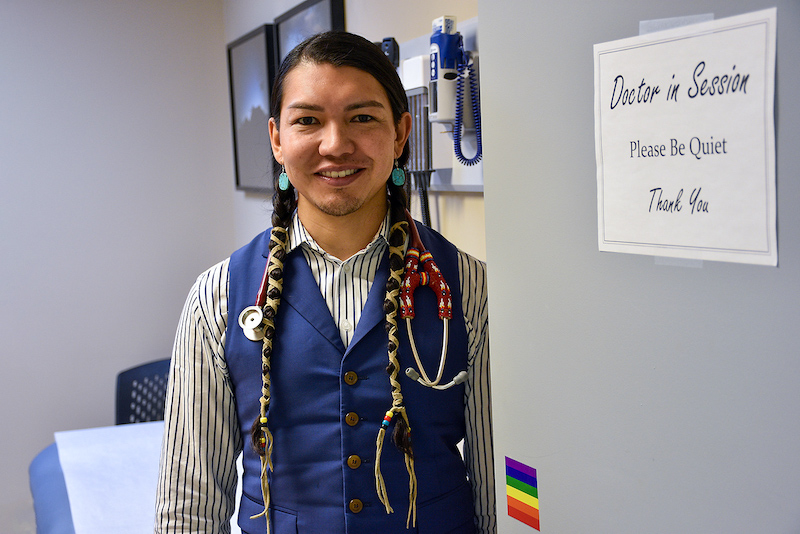James Makokis, '04 BSc(Nutr/Food), is many things: a doctor, a two-spirit man from Saddle Lake Cree Nation and an ultramarathon trail runner who married his husband partway through the Vancouver marathon. (The pair also participated in Amazing Race Canada.) Now he's helping both transgender and Indigenous people find healing and health, with practices in Edmonton and Kehewin.
What do we miss when we talk about Indigenous health markers?
Every report says Indigenous people want access to their own medicines, culture, songs, languages. Treaty 6 was the only one to include a commitment to provide medical care and services in our treaty territory - we didn't intend to give up our medicines. When Cree healing practices are funded alongside western medicine, we'll begin to decolonize our health and healing. We're doing this in Kehewin with assistance from a three-year federal grant that focuses on Cree birthing practices. For instance, my husband is co-ordinating the groundwork for a birthing centre that revitalizes Cree midwifery. Children can be born with traditional ceremonies; the first welcoming songs they hear will be in our language. I began my practice in Kehewin because the elders, council and health director believe in our Cree medicines and the strength of our culture.
How are the barriers in health similar for transgender and Indigenous people?
These people experience the same things: marginalization, oppression, discrimination, substandard health care and lack of access to health care, which doesn't change to address these gaps.
So, why aren't there more doctors who work with transgender patients?
Many family doctors don't feel confident to assess gender dysphoria and prescribe hormone transitioning. When I'm training residents or other doctors, I remind them they already do hormone therapy: contraceptives, postmenopause therapy, hormone therapy in older males.
How do you ease the suffering of Indigenous transgender youth?
Half of two-spirit Indigenous people have attempted suicide. I want to change those stats, so in addition to providing medical hormone treatment to trans patients, I ask, "What else can we do?" It can mean decolonizing our traditional ceremonial spaces like sweat lodge ceremonies and other ceremonies and making the space inclusive to people from all genders. In our traditional rite-of-passage ceremonies, two-spirit youth should have the chance to participate in whatever gender they're transitioning to.
What would you love to add to your practice? Dream big!
I'd open a clinic where I can work seamlessly in both Cree and western systems. Colonization took away our ceremonies, which gave us our systems for health and social norms. To be happy, healthy and whole, we need to rebuild these. Reconciliation means rebuilding what was taken away, meaningfully and sustainably.

We at New Trail welcome your comments. Robust debate and criticism are encouraged, provided it is respectful. We reserve the right to reject comments, images or links that attack ethnicity, nationality, religion, gender or sexual orientation; that include offensive language, threats, spam; are fraudulent or defamatory; infringe on copyright or trademarks; and that just generally aren’t very nice. Discussion is monitored and violation of these guidelines will result in comments being disabled.